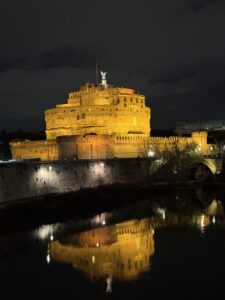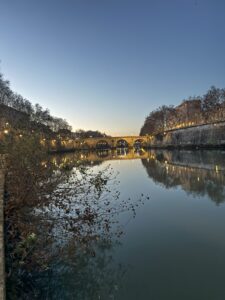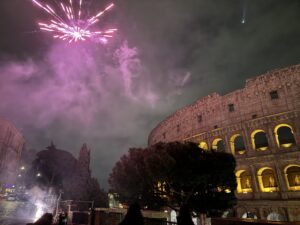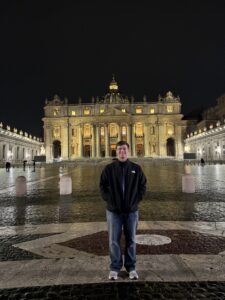The second week of our Study Abroad Trip in Rome has continued to enhance my knowledge of history, democracy, and leadership while allowing plenty of time for exploration and fun. We visited places where some of the most renowned leaders, religions, and ideas were created or expanded upon. Rome reflected the lessons learned by the Greeks but aimed to be far greater than Greece ever was. We visited the Colosseum, Roman Forum, Pantheon, Sistine Chapel, St. Peter’s Basilica, the Vatican Museum, Ostia Antica, and more. Each of these places holds a rich history that we were able to learn from while abroad.
The lessons that stuck out to me the most from Rome are those from the time of Julius Caesar and the time of Hadrian. Julius Caesar sticks out as one of the more well-known rulers of Rome. Caesar showed a strategic prowess in his military campaigns that is rarely seen throughout history. The Roman army under his rule was unstoppable, but one thing we can learn from Caesar is how pride can take down even the most outstanding leaders. Caesar ruled as a tyrant and even proclaimed to be God. He wanted Caesar to be great rather than the people of Rome. This focus led to the betrayal of his closest friend, Brutus.
On the other hand, Hadrian’s life reflects a different leadership style. Hadrian was more focused on the people. He is said to have traveled around his empire most of his reign and embraced the flourishing of other cultures, similar to Alexander the Great. A prime example of this is seen in his completion of the Temple of Zeus for Greece. By allowing others to embrace their cultures and working to connect with his people, his reign was viewed by the people in a much better light. Both leaders were successful in their own ways, but the reign of Caesar left the Roman Empire in complete disarray, while Hadrian built a legacy that helped propel the Roman Empire forward.
One thing that did surprise me in Rome was the vast amount of Grecian influence I recognized. Before this trip, I had never really considered just how much the great Roman Empire was built upon the ideas and principles originated by the Greeks. Rome took the Ancient Greek Mythology and simply renamed the gods, except Apollo; they used key ideas of democracy first taught in Athens, learned military strategy from Sparta, and built buildings and monuments quite similar to those in Athens.
This trip, as a whole, has been both fun and educational. We covered thousands of years of history and dove deep into the leadership characteristics of some of the most outstanding leaders ever. Still, we were able to enjoy our time in the two cities and immerse ourselves in the culture to understand the ideas and perspectives of people across the globe.





